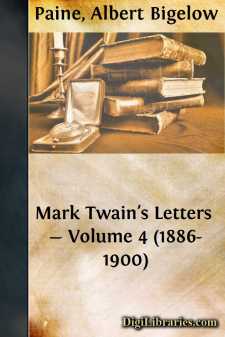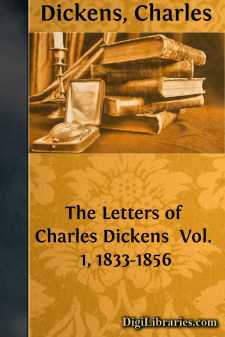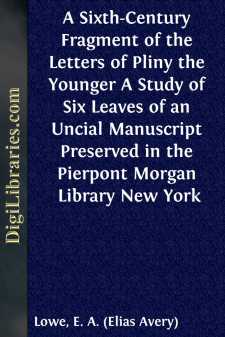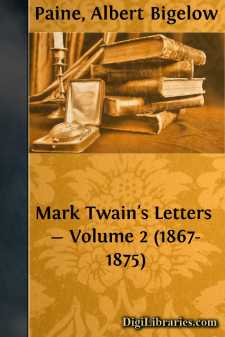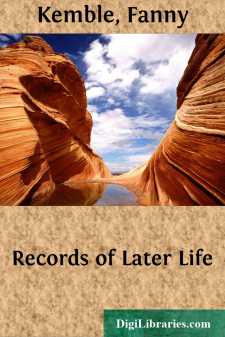Literary Collections
- American 84
- Ancient, Classical & Medieval 14
- Asian 1
- Australian & Oceanian 1
- Canadian 55
- Continental European 121
- English, Irish, Scottish, Welsh 179
- Essays 160
- General 24
- Letters
- Middle Eastern 1
Letters Books
Sort by:
To W. D. Howells; in Boston: Jan. 3, '86. MY DEAR HOWELLS,—The date set for the Prince and Pauper play is ten days hence—Jan. 13. I hope you and Pilla can take a train that arrives here during the day; the one that leaves Boston toward the end of the afternoon would be a trifle late; the performance would have already begun when you reached the house. I'm out of the woods. On the last day...
more...
My Dear Sir, Many thanks for your interesting and kind letter, in which you do me the honour to ask my opinion respecting the pedigree of your island goblin, le feu follet Belenger; that opinion I cheerfully give, with a promise that it is only an opinion; in hunting for the etymons of these fairy names we can scarcely expect to arrive at any thing like certainty. I suppose you are aware that the name...
more...
PREFACE TO LETTERS AND LITERARY REMAINS After Mr. FitzGerald’s death in June 1883 a small tin box addressed to me was found by his executors, containing among other things corrected copies of his printed works, and the following letter, which must have been written shortly after my last visit to him at Easter that year: Woodbridge: May 1/83. My dear Wright, I do not suppose it likely that any of my...
more...
by:
Charles Dickens
PREFACE.Weintend this Collection of Letters to be a Supplement to the "Life of Charles Dickens," by John Forster. That work, perfect and exhaustive as a biography, is only incomplete as regards correspondence; the scheme of the book having made it impossible to include in its space any letters, or hardly any, besides those addressed to Mr. Forster. As no man ever expressedhimselfmore in his...
more...
PREFATORY NOTE. T HE Pierpont Morgan Library, itself a work of art, contains masterpieces of painting and sculpture, rare books, and illuminated manuscripts. Scholars generally are perhaps not aware that it also possesses the oldest Latin manuscripts in America, including several that even the greatest European libraries would be proud to own. The collection is also admirably representative of the...
more...
by:
Helen Clergue
CHAPTER 1. GEORGE SELWYN—HIS LIFE, HIS FRIENDS, AND HIS AGE During the latter half of the eighteenth century no man had more friends in the select society which comprised those who were of the first importance in English politics, fashion, or sport, than George Selwyn. In one particular he was regarded as supreme and unapproachable; he was the humourist of his time. His ban mots were collected and...
more...
To Bret Harte, in San Francisco: WESTMINSTER HOTEL, May 1, 1867. DEAR BRET,—I take my pen in hand to inform you that I am well and hope these few lines will find you enjoying the same God's blessing. The book is out, and is handsome. It is full of damnable errors of grammar and deadly inconsistencies of spelling in the Frog sketch because I was away and did not read the proofs; but be a friend...
more...
by:
Fanny Kemble
RECORDS OF LATER LIFE. Philadelphia, October 26th, 1834. Dearest Mrs. Jameson, However stoutly your incredulity may have held out hitherto against the various "authentic" reports of my marriage, I beg you will, upon receipt of this, immediately believe that I was married on the 7th of June last, and have now been a wife nearly five mortal months. You know that in leaving the stage I left...
more...
PREFACE The object of this book is to give the English-speaking public, in a convenient form, as faithful and readable a copy as the translator was capable of making of a document unique in the literature of antiquity. Whether we regard the correspondence of Cicero from the point of view of the biographer and observer of character, the historian, or the lover of belles lettres, it is equally worthy of...
more...
FIRST PART. LIFE'S JOYS AND SORROWS.1783 TO 1815. 1.TO THE ELECTOR OF COLOGNE, FREDERICK MAXIMILIAN. ILLUSTRIOUS PRINCE,-- Music from my fourth year has ever been my favorite pursuit. Thus early introduced to the sweet Muse, who attuned my soul to pure harmony, I loved her, and sometimes ventured to think that I was beloved by her in return. I have now attained my eleventh year, and my Muse often...
more...


